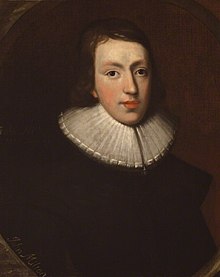John Milton
| John Milton | |
|---|---|

Portrait of John Milton in National Portrait Gallery, London ca. 1629. Unknown artist (detail)
| |
| Born | 9 December 1608 (Old style) Bread Street, Cheapside, London, England |
| Died | 8 November 1674 (aged 65) Bunhill, London, England |
| Resting place | St Giles-without-Cripplegate |
| Occupation | Poet, prose polemicist, civil servant |
| Language | English, Latin, French, German,Greek, Hebrew, Italian, Spanish,Aramaic, Syriac |
| Nationality | English |
| Alma mater | Christ's College, University of Cambridge |
| Signature | |
John Milton (9 December 1608 – 8 November 1674) was an English poet, polemicist, a scholarly man of letters, and a civil servant for the Commonwealth of England under Oliver Cromwell. He wrote at a time of religious flux and political upheaval, and is best known for his epic poem Paradise Lost.
Milton's poetry and prose reflect deep personal convictions, a passion for freedom and self-determination, and the urgent issues and political turbulence of his day. Writing in English, Latin, and Italian, he achieved international renown within his lifetime, and his celebratedAreopagitica (written in condemnation of pre-publication censorship) is among history's most influential and impassioned defenses of free speech and freedom of the press.
William Hayley's 1796 biography called him the "greatest English author,and he remains generally regarded "as one of the preeminent writers in the English language,though critical reception has oscillated in the centuries since his death (often on account of his republicanism). Samuel Johnson praised Paradise Lost as "a poem which...with respect to design may claim the first place, and with respect to performance, the second, among the productions of the human mind," though Johnson (a Tory and recipient of royal patronage) described Milton's politics as those of an "acrimonious and surly republican".
Because of his republicanism, Milton has been the subject of centuries of British partisanship (a "nonconformist" biography by John Toland, a hostile account by Anthony à Wood etc.).
No comments:
Post a Comment